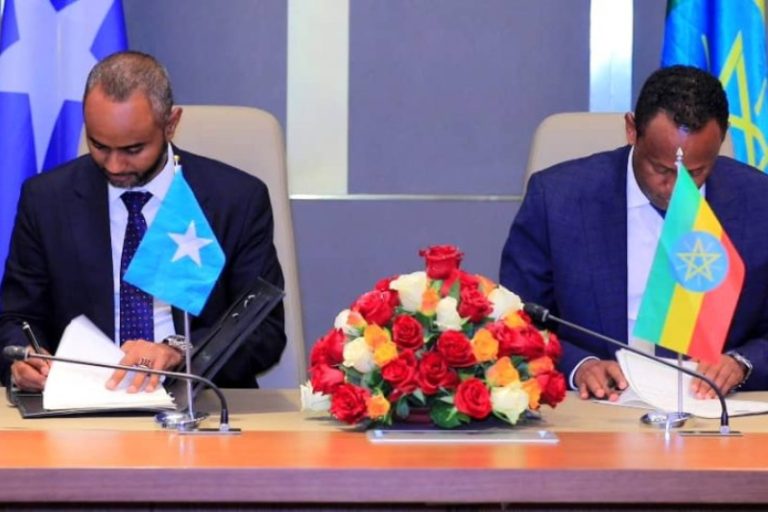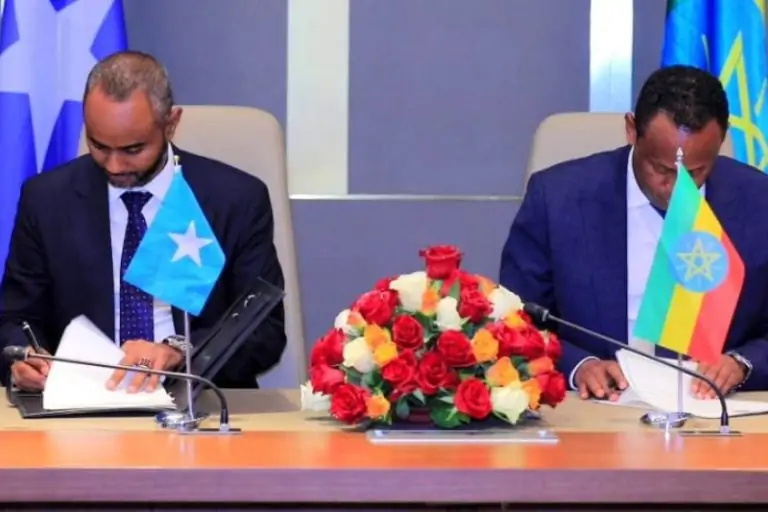

ethiopia somalia tensions aus diplomatic gambit amid geopolitical strain
Last updated on January 22nd, 2024 at 04:21 pm
In a bid to avert the escalating tensions between Ethiopia and Somalia, the African Union’s Peace and Security Council (PSC) has taken decisive action. Olusegun Obasanjo, the former president of Nigeria, has been dispatched to facilitate negotiations and mediate the delicate geopolitical situation arising from the recent agreement between Ethiopia and Somaliland.
The crux of the tensions lies in Somaliland’s decision to sign an agreement with Ethiopia on January 1st, ceding sovereignty over a marine port and a military facility on the Red Sea. This move by Somaliland, a breakaway province seeking international recognition since 1991, has heightened geopolitical sensitivities in the region. Somalia responded with a declaration that it is prepared to go to war, recalling historical conflicts between the two nations.
Ethiopia and Somalia have a history of territorial disputes, notably contesting boundaries in 1977. In 2006, Ethiopia’s military intervention in Somalia was part of the global war on terrorism. The current tensions, exacerbated by Somaliland’s agreement with Ethiopia, threaten to reignite historical animosities.
Olusegun Obasanjo faces a complex diplomatic challenge in mediating between Ethiopia and Somalia. The denial of entry to a plane carrying Ethiopian representatives to Somaliland adds an additional layer of complexity to the situation. The African Union emphasizes adherence to fundamental principles and international law in bilateral and international relations, urging a diplomatic resolution to the brewing conflict.
The African Union considers Somaliland to be a province of Somalia, yet Somaliland seeks international recognition through engagements with neighboring countries. The delicate geopolitical dance requires careful mediation to prevent external interference and ensure a resolution acceptable to all parties involved.
Somalia has taken a firm stance, refusing dialogue with Ethiopia until the latter reverses its agreement with Somaliland. The Somali Ministry of Foreign Affairs accuses Ethiopia of violating its sovereignty and territorial integrity through an allegedly illegal agreement with Somaliland. Somalia insists on the annulment of this agreement as a precondition for any meaningful mediation efforts.
The issue was discussed at an extraordinary summit held by the Intergovernmental Authority on Development (IGAD) in Kampala, Uganda. The summit emphasized the need to prevent external meddling in the matter. Somalia’s refusal to engage in talks with Ethiopia further complicates diplomatic efforts, setting stringent conditions for any potential dialogue.
The primary hurdle in diplomatic negotiations remains Ethiopia’s deal with Somaliland. Somalia insists on the reversal of this agreement as a prerequisite for meaningful dialogue. The intervention of Olusegun Obasanjo aims to navigate these challenges and find a resolution that upholds the sovereignty and territorial integrity of Somalia.
Africa is taking big steps by entering the global green technology manufacturing market to stop being just a supplier of…
Two mobile telecom leaders, MTN Group and Airtel Africa, joined forces to create a new digital infrastructure system throughout African…
South African President Cyril Ramaphosa defended his nation against claims of white discrimination made by tech magnate Elon Musk. After…
Hilton launched Signia by Hilton for its first appearance in Egypt and Africa through its hotel expansions. These hotels at…
UNICEF reported that, nearly 2900 people died of cholera across Eastern and Southern African countries while children suffer most greatly…
Enza, based in the United Arab Emirates, obtained $6.75 million in initial investment funding from Algebra Ventures and Quona Capital.…
This website uses cookies.